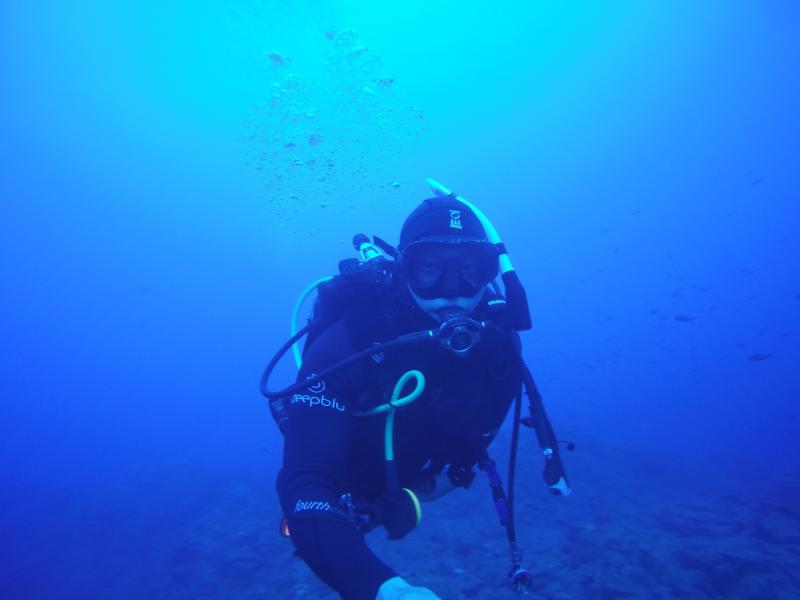June 2018, London
Deepblu takes a social dive into a billion dollar market
With ocean pollution enjoying unprecedented media coverage, what better time to launch a trip-planning platform that encourages the online dive community to share experiences
Very often business-to-consumer startups in the highly competitive online travel space, can find themselves in deep, shark infested waters. But James Tsuei, CEO of Deepblu Inc, believes he has found a relatively untapped billion-dollar market, and is on a mission to create the world’s biggest online social community for divers.
Though stats are hard to come by, if you take into account dive equipment sales, education and training and tourism, this is, according to Tsuie, an industry worth between $20bn and $30bn.

James Tsuei, CEO, Deepblu Inc
According to a report by the Diving Equipment and Marketing Association (DEMA), recreational scuba diving and snorkeling in the US alone contributes around $11bn to gross domestic product. There are also, says DEMA, between 2.7 to 3.5 million active scuba divers in the US and as many as 6 million active scuba divers worldwide. Meanwhile, when it comes to snorkellers, there are an estimated 11 million in the US and approximately 20 million worldwide.
So, Tsuie, who launched Deepblu Inc in late 2015 with its first product, the COSMIQ dive computer followed by a dive log app in 2016, believes he is onto something. The latest addition is Planet Deepblu, a marketplace for the dive community.
Dive enthusiast Tsuei says he first spotted the gap in the market while doing his scuba certification in 2011. “Back then most types of travel experience could be bought online but compared to other verticals, and this is still the case today, diving tourism was much less developed.”
Not only did Tsuei spent too much time trying to piece together where he should or could go, he struggled to find basic information like the best time of year to travel, or reviews on local dive businesses. “I did a lot of form searching before I finalised my plans and was able to book with a provider,” he says.
Timing it right
With David Attenborough’s Planet Earth documentary spurring unprecedented media coverage about ocean pollution and conservation, arguably the firm’s most recent addition, Planet Deepblu, which encourages divers to share their own user-generated experiences, is well timed.
“The diving community is among the strongest advocacy groups for supporting ocean conservation and they are always sharing stories on Deepblu to raise awareness,” says Tsuei. From capturing the release of a turtle caught in a net on video to images of divers bringing up several binbags of waste, there are hundreds of posts of Deepblu divers doing their bit for a worthy cause.
But that’s not just the only function of Planet Deepblu, which, according to Tsuei, utilisies Deepblu’s 300,000 dive logs in 10,000 spots around the world, as well as reviews created by 40,000 active users. In doing so, it has created a marketplace where dive businesses can list their services, and users can find and book their next dive. In essence, the goal is to simplify the dive trip planning and booking process so divers can select dates, read reviews, find pricing, set up and book all in one place. In addition, they can locate their favourite countries, regions, and spots through the platform, and identify relevant products or services – from a brand new cave dive to a certification course - in any area.
Crucially though, Deepblu is relying on divers sharing their own user-generated experiences to the platform from its own COSMIQ+ computer, or any other subsurface-compatible dive device; they can also create dive logs from scratch.

Growing the businesses
So, what is the strategy going forward? For the moment, Tsuei is focused on achieving scale, so the platform is currently free for both divers and dive businesses. In time, however, this is expected to move to a commission-based model.
The initial roll out of dive experiences is focused on the North American market with service providers concentrated in the Caribbean, Florida Keys, and Mexico, but the plan is to quickly expand to all dive destinations worldwide.
Increasingly, big names like Expedia and Booking.com, and even airlines and hotels, are looking to meet the needs of the traveller at all stages of the journey. So, another revenue stream could come from B2B partnerships, a route that others, like other B2C experience platforms GetYourGuide, have followed.
As with any part of the travel industry, the competition will be tough. Planet Deepblu’s main competititor is Padi Travel, which claims to have the biggest selection of so-called liveaboard packages. But Tsuie argues that Planet Deepblu go further by providing all kinds of experiences including wreck diving, shark diving, cave diving and even dive experiences for the physically challenged. There are also scuba-focused OTAs like divebooker.com.

